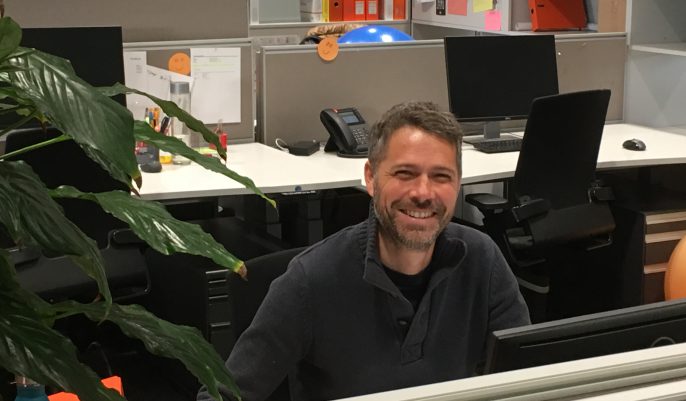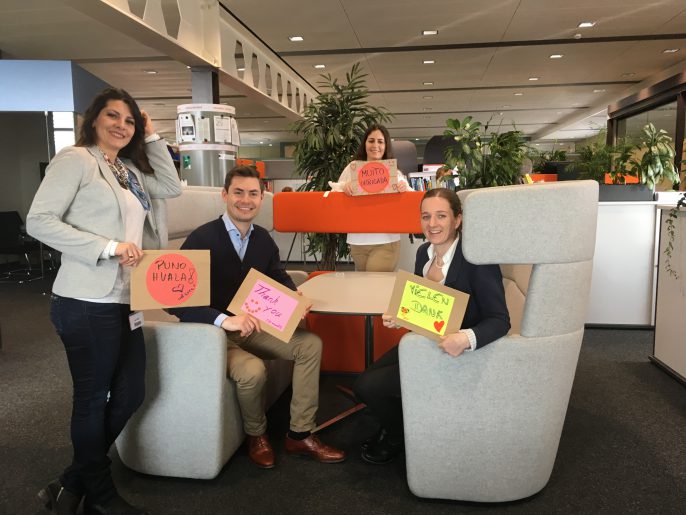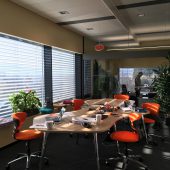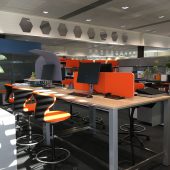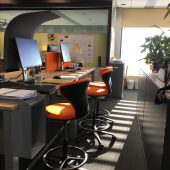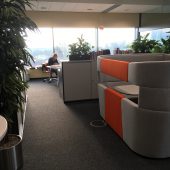New support in employee-coaching …
What do “Wälder”* traditional crafts and employee coaching have in common?
* specific Austrian dialect word for the people living in the Bregenz forest region
Bernhard Dünser
In the spring of 2017, Bernhard experienced our work during an internship. Now we were able to win him over as a colleague in the BIC.
He enriches our team with this special sense of humor, his experience and his expertise in the areas of employee service and employee coaching. Welcome aboard and good luck in working with us and all colleagues at Blum!
– HomePage Editorial Team –
Olá, Servus, Zdravo, Hallo – Welcome on Bord!
Fresh international impulses for our BIC-Team
In connection with our own OD-process we have discovered that we need support in the following areas:
- International Coaching
- Social and economic trends and developments
- Organisation and service
- Knowledge and learning
Now we are happy that we have found 4 international team members as personnel reinforcement to support us in all upcoming topics and challenges in the fields of personnel- and organizational development.
Welcome!
Amela Hamzic-Rieser – Bosnia
Jan Sebastian Schneberger – Germany
Ana De Bastos Mota – Portugal
Eva Flatz – Austria
(from left to right)
– HomePage Editorial Team –
Olá, Servus, Zdravo, Hallo – welcome on board!
Fresh international impulses for our BIC-Team
In connection with our own OD-process we have discovered that we need support in the following areas:
- International Coaching
- Social and economic trends and developments
- Organisation and service
- Knowledge and learning
Now we are happy that we have found 4 international team members as personnel reinforcement to support us in all upcoming topics and challenges in the fields of personnel- and organizational development.
Welcome!
Amela Hamzic-Rieser – Bosnia
Jan Sebastian Schneberger – Germany
Ana De Bastos Mota – Portugal
Eva Flatz – Austria
(from left to right)
– HomePage Editorial Team –
Find the place you need …!
We try out a new approach – and invite others to watch us at work!
A few months ago we declared our Personnel Development Department a “flexible work area”. Shortage of space and the need for communication zones and marketplaces prompted us to rethink our approach and not kit out the free space with desks. We’ve dispensed with a rigid grid and introduced various working zones. Under the slogan “Find the place you need”, our employees now use the space they find most suitable for the tasks in hand. In the middle of this flexible work area, we have five “permanent workplaces”, so we’ve created a mixed office landscape. The first outcome is that we have far more different layouts for work and collaboration within the same office space. We believe this is a good start. But the new approach has not only created more possibilities. It has also given us the opportunity to reflect on various questions:
- Is my daily search for a workplace liberating or does it impede my productivity?
- Does this freedom increase or stifle creativity?
- Does this mode of work promote or reduce dynamism?
- Is it beneficial or detrimental to team cohesion?
- …..
We are glad to share our experiences and impressions with various departments from BLUM, whose teams have already visited us and watched us at work! – HomePage Editorial Team –
Esteem – an underestimated motivator
Esteem is a positive appreciation of others. It is based on your inner attitude towards them and applies to the person as a whole, to their nature. It has less to do with the person’s actions or performance although these factors influence your subjective assessment of the person and consequently your regard for them. (Translation of the definition of “Wertschätzung”, Wikipedia)
There is no doubt that esteem is a source of motivation. People are social beings, and esteem presents the typical human desire to be accepted and valued. Other forms of showing positive regard for others are, for example, saying “please” and “thank you”, looking others in the eye, treating them like equals, paying attention to what they are saying, listening to them, asking questions or smiling. It’s the small gestures that have the biggest impact.
We believe that this video shows well what effect “positive regard” can have. See for yourself … (Karin Steffan)
